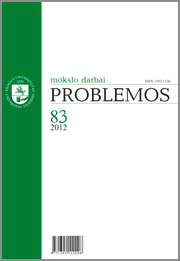ŽANRINIO APOKALIPSĖS KINO DEKONSTRUKCIJA A. KUROSAWOS „RASHOMONE“
THE DECONSTRUCTION OF APOCALYPSE GENRE CINEMA IN KUROSAWA’S “RASHOMON”
Author(s): Nerijus MileriusSubject(s): Theatre, Dance, Performing Arts
Published by: Vilniaus Universiteto Leidykla
Keywords: apocalypse film; the representation of death in film; Kurosawa; “Rashomon”
Summary/Abstract: The paper deals with the effort to go beyond the boundaries of commercial apocalypse film. It is argued that as non-commercial apocalypse films are not based on the single formula it is impossible to find one unifying thematic base for them. Nevertheless, non-commercial apocalypse films are not united not by their content, but by the effort to radicalize the cinematic visions of the apocalypse. Having radicalized the visions of the end of the world, non-commercial apocalypse film begins to function as a critical tool for the analysis of the capitalist end of the world industry. This paper shows how the commercial apocalypse film depicts death and sells immortality to a viewer. Such commercial strategy of the apocalypse film is opposed to the relation with death in Shakespeare’s “Hamlet” and the Akira Kurosawa’s “Rashomon”. In the paper the parallels between a reader of “Hamlet” and a viewer of “Rashomon” are revealed. It is argued that “Rashomon” can be interpreted as a tool to unmask the blindness of the viewer. The analysis of “Rashomon” leads to the notions of Slavoj Žižek and Jean Baudrillard which allow discovering the analogous blindness of the viewer in the commercial apocalypse film.
Journal: Problemos
- Issue Year: 2013
- Issue No: 83
- Page Range: 145-158
- Page Count: 14

